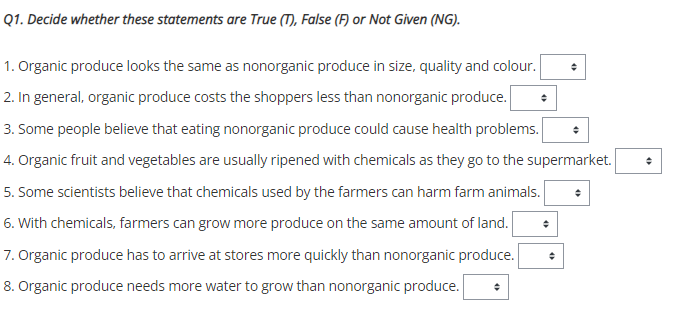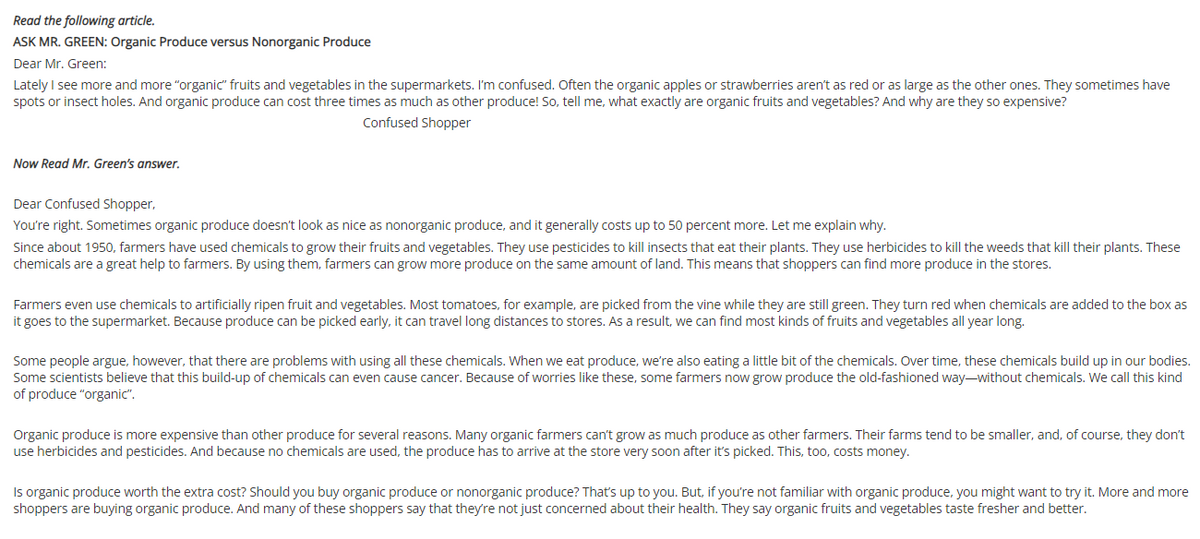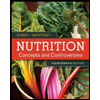. In general, organic produce costs the shoppers less than nonorganic produce. . Some people believe that eating nonorganic produce could cause health problems. . Organic fruit and vegetables are usually ripened with chemicals as they go to the supermarket . Some scientists believe that chemicals used by the farmers can harm farm animals. . With chemicals, farmers can grow more produce on the same amount of land. . Organic produce has to arrive at stores more quickly than nonorganic produce. Organic produce needs more water to grow than ponorganic produce
. In general, organic produce costs the shoppers less than nonorganic produce. . Some people believe that eating nonorganic produce could cause health problems. . Organic fruit and vegetables are usually ripened with chemicals as they go to the supermarket . Some scientists believe that chemicals used by the farmers can harm farm animals. . With chemicals, farmers can grow more produce on the same amount of land. . Organic produce has to arrive at stores more quickly than nonorganic produce. Organic produce needs more water to grow than ponorganic produce
Chapter4: Understanding Food And Nutrition Labels
Section: Chapter Questions
Problem 8RQ
Related questions
Question

Transcribed Image Text:Q1. Decide whether these statements are True (T), False (F) or Not Given (NG).
1. Organic produce looks the same as nonorganic produce in size, quality and colour.
2. In general, organic produce costs the shoppers less than nonorganic produce.
3. Some people believe that eating nonorganic produce could cause health problems.
4. Organic fruit and vegetables are usually ripened with chemicals as they go to the supermarket.
5. Some scientists believe that chemicals used by the farmers can harm farm animals.
6. With chemicals, farmers can grow more produce on the same amount of land.
7. Organic produce has to arrive at stores more quickly than nonorganic produce.
8. Organic produce needs more water to grow than nonorganic produce.

Transcribed Image Text:Read the following article.
ASK MR. GREEN: Organic Produce versus Nonorganic Produce
Dear Mr. Green:
Lately I see more and more "organic" fruits and vegetables in the supermarkets. I'm confused. Often the organic apples or strawberries aren't as red or as large as the other ones. They sometimes have
spots or insect holes. And organic produce can cost three times as much as other produce! So, tell me, what exactly are organic fruits and vegetables? And why are they so expensive?
Confused Shopper
Now Read Mr. Green's answer.
Dear Confused Shopper,
You're right. Sometimes organic produce doesn't look as nice as nonorganic produce, and it generally costs up to 50 percent more. Let me explain why.
Since about 1950, farmers have used chemicals to grow their fruits and vegetables. They use pesticides to kill insects that eat their plants. They use herbicides to kill the weeds that kill their plants. These
chemicals are a great help to farmers. By using them, farmers can grow more produce on the same amount of land. This means that shoppers can find more produce in the stores.
Farmers even use chemicals to artificially ripen fruit and vegetables. Most tomatoes, for example, are picked from the vine while they are still green. They turn red when chemicals are added to the box as
it goes to the supermarket. Because produce can be picked early, it can travel long distances to stores. As a result, we can find most kinds of fruits and vegetables all year long.
Some people argue, however, that there are problems with using all these chemicals. When we eat produce, we're also eating a little bit of the chemicals. Over time, these chemicals build up in our bodies.
Some scientists believe that this build-up of chemicals can even cause cancer. Because of worries like these, some farmers now grow produce the old-fashioned way-without chemicals. We call this kind
of produce "organic".
Organic produce is more expensive than other produce for several reasons. Many organic farmers can't grow as much produce as other farmers. Their farms tend to be smaller, and, of course, they don't
use herbicides and pesticides. And because no chemicals are used, the produce has to arrive at the store very soon after it's picked. This, too, costs money.
Is organic produce worth the extra cost? Should you buy organic produce or nonorganic produce? That's up to you. But, if you're not familiar with organic produce, you might want to try it. More and more
shoppers are buying organic produce. And many of these shoppers say that they're not just concerned about their health. They say organic fruits and vegetables taste fresher and better.
Expert Solution
This question has been solved!
Explore an expertly crafted, step-by-step solution for a thorough understanding of key concepts.
Step by step
Solved in 2 steps

Knowledge Booster
Learn more about
Need a deep-dive on the concept behind this application? Look no further. Learn more about this topic, biology and related others by exploring similar questions and additional content below.Recommended textbooks for you


Nutritional Sciences: From Fundamentals to Food, …
Health & Nutrition
ISBN:
9781337486415
Author:
McGuire
Publisher:
Cengage

Nutrition: Concepts and Controversies - Standalo…
Health & Nutrition
ISBN:
9781305627994
Author:
Frances Sizer, Ellie Whitney
Publisher:
Brooks Cole


Nutritional Sciences: From Fundamentals to Food, …
Health & Nutrition
ISBN:
9781337486415
Author:
McGuire
Publisher:
Cengage

Nutrition: Concepts and Controversies - Standalo…
Health & Nutrition
ISBN:
9781305627994
Author:
Frances Sizer, Ellie Whitney
Publisher:
Brooks Cole



Biology 2e
Biology
ISBN:
9781947172517
Author:
Matthew Douglas, Jung Choi, Mary Ann Clark
Publisher:
OpenStax